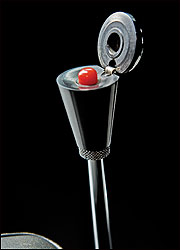Nov
7
Skyfall — worthy of an Oscar?
November 7, 2012 | Leave a Comment
So John Logan wants a screenplay oscar for Skyfall . . . well it’s a good film to be sure although I thought Casino Royale pipped it for overall entertainment value. But is any Bond screenplay really worthy of academy attention?
From a dialogue point of view the early scenes in Skyfall are good. The usual terse exhanges setting up the initial plot point are great but later on they really start motoring with Bond’s word association psychological test which is a hoot and, I suspect, was great fun to write: the initial tightening of the tension as Bond and the boffin sqaure up followed by the bland word play itself seemingly leading nowhere until boom . . . the boffin says ‘Skyfall’ and Bond walks out (not a spoiler by the way). This scene is brilliantly conceived and a wonderful way of hooking us into the rest of the story. If, like me, you went into the film thinking its title was just another lame baddie’s lair or some dastardly evil weapon then you will be pleasantly surprised.
The biggest glitch however, comes in the scene where Bond is driving M up north in the old Aston Martin DB5 which was originally used in Goldfinger. M starts complaining about something and Bond reaches down and flips the cap of the gearstick to reveal an enticing red button . . . nuff said right there you would think but no, they go and ruin it with M’s response which made me groan out loud (“Go ahead eject me, see if I care”). I can almost picture the conversation: “Whoa . . . we gotta explain what that red button is for right?”, “Yeah might confuse some people”. How much better would it have been for Bond to flick that cap, and let his thumb hover ominously over the button with a mock evil “be quiet or else” stare at M. Even if you haven’t seen Goldfinger, there can be few out there who aren’t familiar with Bond’s gadget-obsessed past and if you are one of the few then it was already explained to you earlier on in the film (in the scene where Q explains that flashy “exploding pens” are a thing of the past). Treat the audience like grown-ups and they’ll love you for it — the internal joy at getting subtle references pays out far more than short term exposition. Admittedly some films take this too far — anyone who says they got all of “Angel Heart” at first sitting is as full of BS as the folks who say they saw the twist in “Sixth Sense” coming a mile away.
In books the mantra is always more show and less tell (as the Query Shark never tires of explaining) although I’ve always maintained a teensy bit of tell on the page is ok now and again. In movies however, it’s unforgivable. As a screenwriter you have an extra weapon at your disposal that novelists would die for: vision. So if you can’t get the message across with 80-feet of great big in-your-face visuals plus a smattering of chiselled prose then I’m afraid that writing Oscar must wait ’til next time.
